Repricing for trie-size-dependent opcodes
相关视频
正文
Simple Summary
This EIP proposes repricing certain opcodes, to obtain a good balance between gas expenditure and resource consumption.
Abstract
The growth of the Ethereum state has caused certain opcodes to be more resource-intensive at this point than
they were previously. This EIP proposes to raise the gasCost for those opcodes.
Motivation
An imbalance between the price of an operation and the resource consumption (CPU time, memory etc) has several drawbacks:
- It could be used for attacks, by filling blocks with underpriced operations which causes excessive block processing time.
- Underpriced opcodes cause a skewed block gas limit, where sometimes blocks finish quickly but other blocks with similar gas use finish slowly.
If operations are well-balanced, we can maximise the block gaslimit and have a more stable processing time.
Specification
At block N,
- The
SLOAD(0x54) operation changes from200to800gas, - The
BALANCE(0x31) operation changes from400to700gas, - The
EXTCODEHASH(0x3F) operation changes from400to700gas, - A new opcode,
SELFBALANCEis introduced at0x47.SELFBALANCEpops0arguments off the stack,SELFBALANCEpushes thebalanceof the current address to the stack,SELFBALANCEis priced asGasFastStep, at5gas.
Rationale
Here are two charts, taken from a full sync using Geth. The execution time was measured for every opcode, and aggregated for 10K blocks. These bar charts show the top 25 'heavy' opcodes in the ranges 5M to 6M and 6M to 7M:
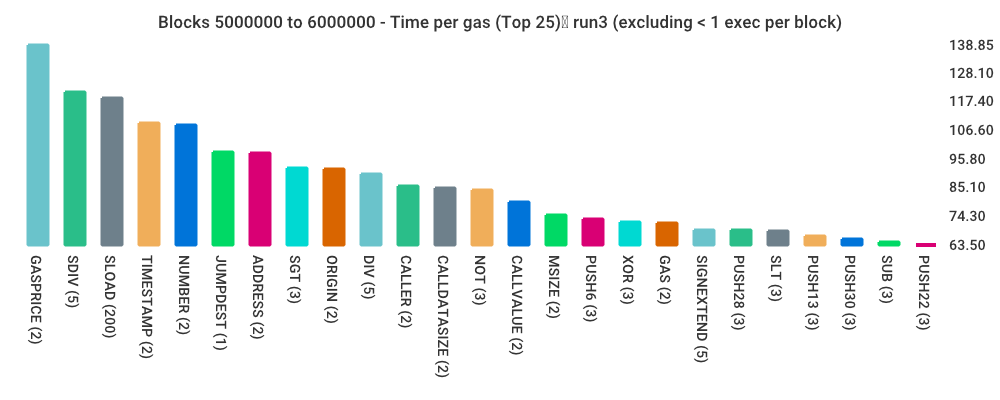
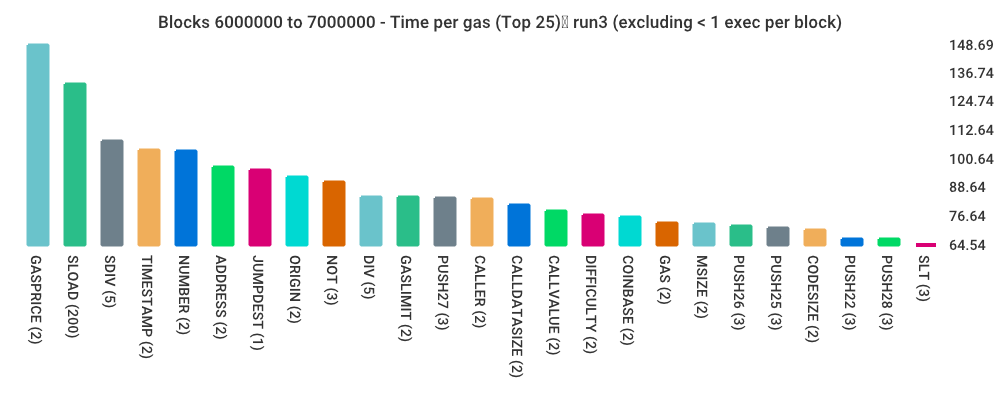
Note: It can also be seen that the SLOAD moves towards the top position. The GASPRICE (0x3a) opcode has position one which I believe can be optimized away within the client -- which is not the case with SLOAD/BALANCE.
Here is another chart, showing a full sync with Geth. It represents the blocks 0 to 5.7M, and highlights what the block processing time is spent on.
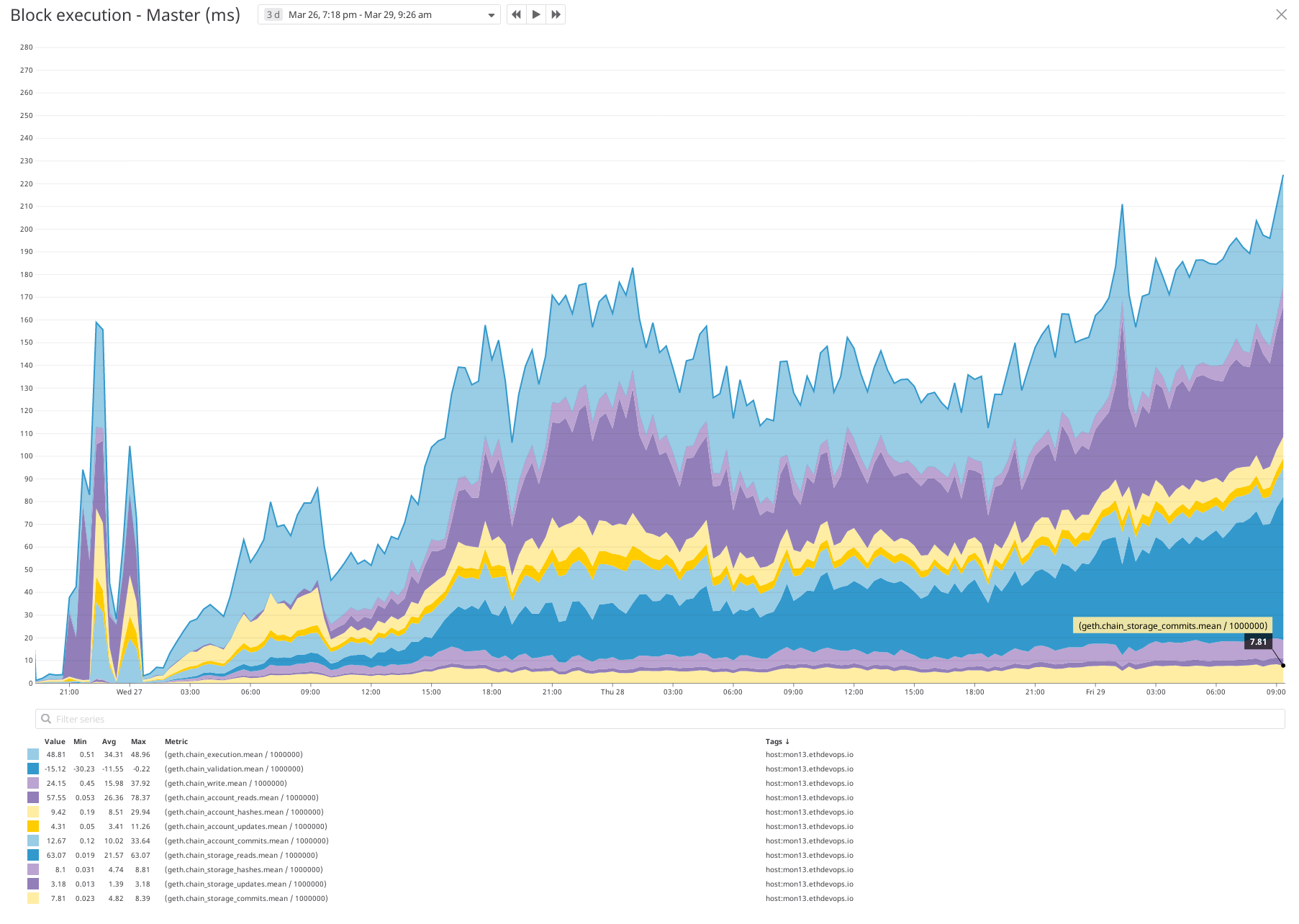
It can be seen that storage_reads and account_reads are the two most significant factors contributing to the block processing time.
SLOAD
SLOAD was repriced at EIP-150, from 50 to 200.
The following graph shows a go-ethereum full sync, where each data point represents
10K blocks. During those 10K blocks, the execution time for the opcode was aggregated.
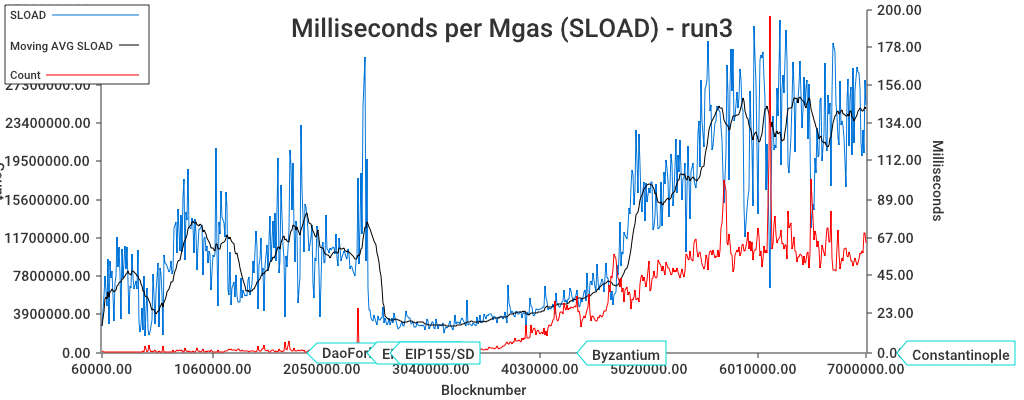
It can be seen that the repricing at EIP-150 caused a steep drop, from around 67 to 23.
Around block 5M, it started reaching pre-EIP-150 levels, and at block 7M
it was averaging on around 150 - more than double pre-eip-150 levels.
Increasing the cost of SLOAD by 4 would bring it back down to around 40.
It is to be expected that it will rise again in the future, and may need future repricing, unless
state clearing efforts are implemented before that happens.
BALANCE
BALANCE (a.k.a EXTBALANCE) is an operation which fetches data from the state trie. It was repriced at EIP-150 from 20 to 400.
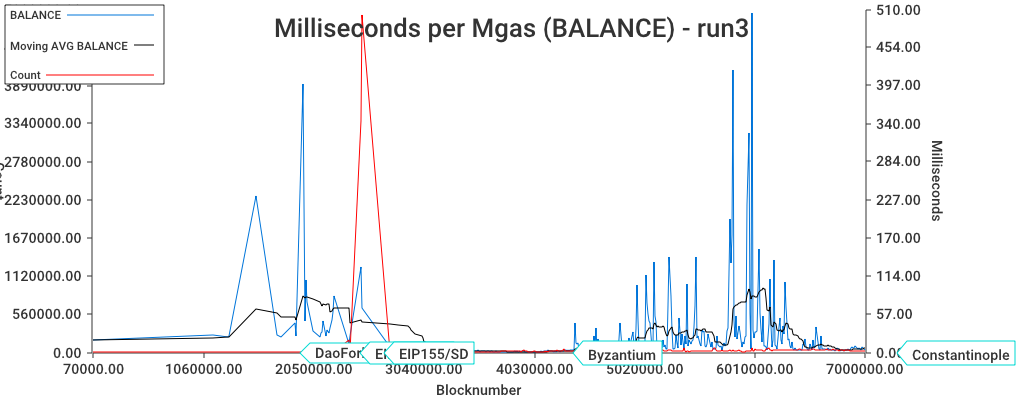
It is comparable to EXTCODESIZE and EXTCODEHASH, which are priced at 700 already.
It has a built-in high variance, since it is often used for checking the balance of this,
which is an inherently cheap operation, however, it can be used to lookup the balance of arbitrary account which often require trie (disk) access.
In hindsight, it might have been a better choice to have two
opcodes: EXTBALANCE(address) and SELFBALANCE, and have two different prices.
- This EIP proposes to extend the current opcode set.
- Unfortunately, the opcode span
0x3Xis already full, hence the suggestion to placeSELFBALANCEin the0x4Xrange. - As for why it is priced at
5(GasFastStep) instead of2(GasQuickStep), like other similar operations: the EVM execution engine still needs a lookup into the (cached) trie, andbalance, unlikegasPriceortimeStamp, is not constant during the execution, so it has a bit more inherent overhead.
- Unfortunately, the opcode span
EXTCODEHASH
EXTCODEHASH was introduced in Constantinople, with EIP-1052. It was priced at 400 with the reasoning:
The gas cost is the same as the gas cost for the
BALANCEopcode because the execution of theEXTCODEHASHrequires the same account lookup as inBALANCE.
Ergo, if we increase BALANCE, we should also increase EXTCODEHASH
Backwards Compatibility
The changes require a hardfork. The changes have the following consequences:
- Certain calls will become more expensive.
- Default-functions which access the storage and may in some cases require more than
2300gas (the minimum gas that is always available in calls). - Contracts that assume a certain fixed gas cost for calls (or internal sections) may cease to function.
- A fixed gas cost is specified in ERC-165 and implementations of this interface do use the affected opcodes.
- The ERC-165 method
supportsInterfacemust return abooland use at most30,000gas. - The two example implementations from the EIP were, at the time of writing
586gas for any input, and236gas, but increases linearly with a higher number of supported interfaces
- The ERC-165 method
- It is unlikely that any ERC-165
supportsInterfaceimplementation will go above30.000gas. That would require that the second variant is used, and thirty:ish interfaces are supported. - However, these operations have already been repriced earlier, so there is a historical precedent that 'the gascost for these operations may change', which should have prevented such fixed-gas-cost assumptions from being implemented.
- A fixed gas cost is specified in ERC-165 and implementations of this interface do use the affected opcodes.
I expect that certain patterns will be less used, for example the use of multiple modifiers which SLOADs the same opcode will be merged into one. It may also lead to less log operations containing SLOADed values that are not strictly necessary.
Test Cases
Testcases that should be implemented:
- Test that
selfbalance == balance(address), - Test that
balance(this)costs as before, - Test that
selfbalancedoes not pop from stack - Gascost verification of
SLOAD,EXTCODEHASHandSELFBALANCE - Verify that
SELFBALANCEis invalid before Istanbul
Some testcases have been implemented as statetests at https://github.com/holiman/IstanbulTests/tree/master/GeneralStateTests
Implementation
This EIP has not yet been implemented in any client. Both these opcodes have been repriced before, and the client internals for managing reprices are already in place.
SELFBALANCE
This is the implementation for the new opcode in go-ethereum:
func opSelfBalance(pc *uint64, interpreter *EVMInterpreter, contract *Contract, memory *Memory, stack *Stack) ([]byte, error) { stack.push(interpreter.intPool.get().Set(interpreter.evm.StateDB.GetBalance(contract.Address()) return nil, nil }
Security considerations
- See backwards compatibility section.
- There are no special edgecases regarding
SELFBALANCE, if we define it asBALANCEwithaddressinstead of popping an address from the stack -- sinceBALANCEis already well-defined. - It should be investigated if Solidity contains any hardcoded expectations on the gas cost of these operations.
- In many cases, a recipient of
etherfrom aCALLwill want to issue aLOG. TheLOGoperation costs375plus375per topic. If theLOGalso wants to do anSLOAD, this change may make some such transfers fail.
Copyright
Copyright and related rights waived via CC0.